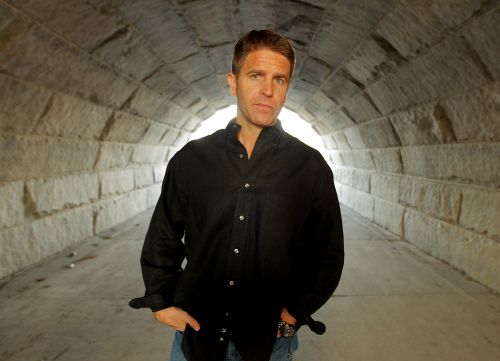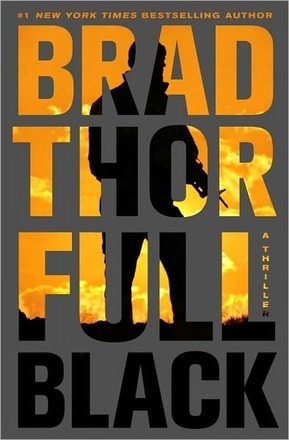When details were released of the recent raid to hunt down and kill Osama Bin Laden in his Abbottabad compound, a daring narrative complete with Navy SEALs and Blackhawk helicopters, many readers of international thrillers probably had the same thought: Sounds like a scene from a Brad Thor novel.
That’s because Thor, like other stars in the thriller-writing genre such as Christopher Reich, Vince Flynn and Daniel Silva, along with emerging powerhouses such as Andrew Grant, writes with gritty authenticity and up-to-the-minute lingo about the most crucial arena in the spy game: international terrorism.
More than any other literary genre of late, the thriller ― characterized by a global venue, a surfeit of action scenes and the certainty of high-stakes consequences ― has been transformed, with the greatest change occurring in the decade since the terrorist attacks against the United States on Sept. 11, 2001.
That’s because Thor, like other stars in the thriller-writing genre such as Christopher Reich, Vince Flynn and Daniel Silva, along with emerging powerhouses such as Andrew Grant, writes with gritty authenticity and up-to-the-minute lingo about the most crucial arena in the spy game: international terrorism.
More than any other literary genre of late, the thriller ― characterized by a global venue, a surfeit of action scenes and the certainty of high-stakes consequences ― has been transformed, with the greatest change occurring in the decade since the terrorist attacks against the United States on Sept. 11, 2001.


Like a master spy donning a new identity, the thriller has reinvented itself.
The genre has gone from portraying the dashing operatives in Ian Fleming’s James Bond novels or John le Carre’s beautifully crafted morality tales featuring melancholy, contemplative spies to the gung-ho warriors in books such as Thor’s latest novel, “Full Black.”
“Thrillers are the most popular form of reading in the past 10 years,” says David Morrell, who created the character of Rambo in his novel “First Blood” (1972) and who now writes thrillers in his Santa Fe home. “9/11 was the game-changer.”
Janice Gable Bashman, Philadelphia-based managing editor of the monthly webzine The Big Thrill and co-author of “Wanted Undead or Alive” (2010), adds, “After 9/11, we began seeing a lot of thrillers that deal with terrorism. Heroes working on their own ― or in conjunction with others within private armies ― hunting terrorists and stopping them from creating havoc in the world.”
When the Cold War effectively ended with the fall of the Soviet Union, the thriller genre was like an old-fashioned spy whose fake mustache suddenly slips off during a dangerous op: It was in deep, deep trouble. Gone was the formerly reliable plotline of nuanced, cloak-and-dagger intrigue featuring double agents and femmes fatales, all tangled up in the long struggle between East and West. Gone was the long-simmering tension between superpowers.
“There wasn’t a common enemy anymore,” muses Grant, brother of best-selling author Lee Child.
“9/11,” adds Grant, a native of Great Britain who now lives in Chicago, “gave readers and writers that common enemy back ― along with an automatic sense of urgency.”
Thor agrees. “There was a stagnant period when we went from the Cold War into the 1990s,” says the author, who has 11 thrillers to his credit. Thor’s novels routinely climb the best-seller lists the way his fictional hero, Scot Harvath, might scale the outside wall of an arms dealer’s hide-out during a midnight raid.
“Then 9/11 happened ― and we had a well-defined enemy again.”
Thor, who lives in Chicago with his wife, Trish Palmer, former team physician for the Chicago Bulls and Chicago White Sox, notes that contemporary thrillers are filled with precise details about military hardware and modern spycraft. Today’s thriller writers have to do their homework.
“Details are the bedrock of a great thriller,” he says. “I’ve worked very hard to develop the best contacts in the intelligence arena so that when you read a Brad Thor book, you get the very latest. When I get email from men and women in the field, they say, ‘You really nailed it.’”
The authenticity extends to techniques as well as hardware. In “Full Black,” readers learn how terrorists trade information online without risking a security breach, and how to avoid suspicion on a stakeout:
“Though he wasn’t a smoker,” Thor writes, “Harvath removed the pack of cigarettes he had purchased, lit one, and hung his arm out the window. It had always been fascinating to him how someone just sitting in a car doing nothing could be suspicious, but the minute you gave him a cigarette and he adopted a casual posture, somehow he became less so. He couldn’t explain why that was, but he’d seen it work enough times that it had become a tactic he liked to employ when he had to hide in plain sight.”
Such nuances are what make the thriller such a distinctive and entertaining genre, says Thor, who recently returned from a trip to Afghanistan to collect information for his stories. “They’re ‘Indiana Jones’ on the page.”
Reich, too, is known for the crisply impeccable specificity of his plots and of the hardware his characters employ. Splitting his time between the San Diego area and the mountains of Switzerland, Reich writes best-selling thrillers that leap through Europe and the Middle East. His latest novel, “Rules of Betrayal” (2010), is the third in a series featuring rough-hewn physician Jonathan Ransom and his mysterious double-agent wife, Emma.
“Images of 9/11 have been emblazoned in everyone’s mind,” says Reich. “As a thriller writer, you can really feed off everyone’s fears of what’s going to happen next. The field is wide open. There is so much going on ― more intrigue, more debauchery.”
Later this month, Reich plans to visit New York to shadow a counterterrorism unit operated by the city’s police department. “It’s so exciting to see what they’re actually doing,” he says. And he knows that his books must be saturated with the reality of weapons and tactics.
In a scene in “Rules of Betrayal,” recently published in paperback by Anchor Books, Ransom ― who is trying to infiltrate the home of Balfour, a terrorist suspected of trying to purchase a nuclear weapon on the black market ― is given a razor cartridge by his handler, Frank Connor. Connor says:
“Looks like a razor blade, but it’s really a flash drive. All you need to do is put this in Balfour’s computer for 10 seconds ― laptop or desktop, doesn’t matter. ... It will install spyware on his computer and send us the entire contents of his machine and every machine it makes contact with. If Achilles built the Trojan Horse today, it would look like this.”
Flash drives and cloud computing are as critical in contemporary thrillers as are AK-47s and C4. And writers are tasked as never before to get their facts in order, says Grant, whose novels include “Even” (2009) and “Die Twice” (2010). They feature British spy David Trevellyan. A third Trevellyan novel is in the works.
“There are new kinds of weapons and new ways of deploying them,” he declares. “We all perceive this unconventional enemy now, this amorphous enemy. And an unconventional enemy calls for an unconventional hero.”
By Julia Keller, Chicago Tribune
(McClatchy-Tribune Information Services)












![[Today’s K-pop] BTS pop-up event to come to Seoul](http://res.heraldm.com/phpwas/restmb_idxmake.php?idx=644&simg=/content/image/2024/04/17/20240417050734_0.jpg&u=)




![[KH Explains] Hyundai's full hybrid edge to pay off amid slow transition to pure EVs](http://res.heraldm.com/phpwas/restmb_idxmake.php?idx=652&simg=/content/image/2024/04/18/20240418050645_0.jpg&u=20240419100350)

